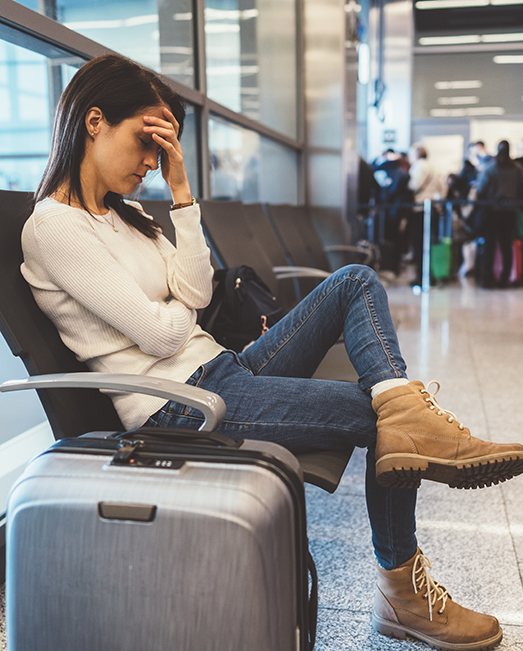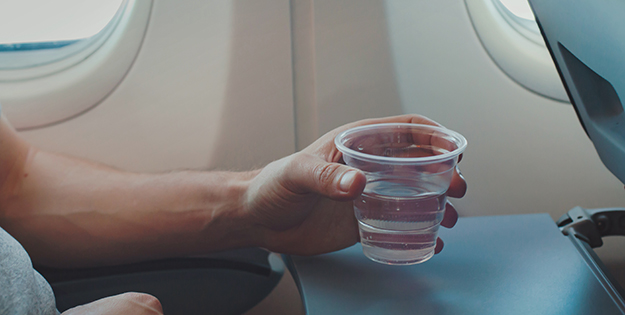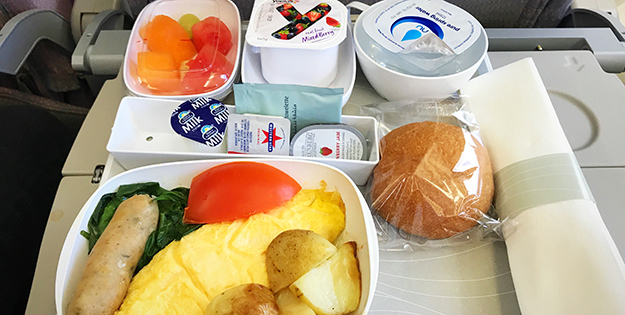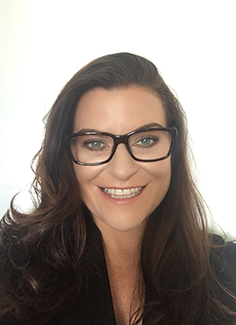Lifestyle
Copyright@ Australian Catholic University 1998-2026 | ABN 15 050 192 660 CRICOS registered provider: 00004G | PRV12008
Copyright@ Australian Catholic University 1998-2026 | ABN 15 050 192 660 CRICOS registered provider: 00004G | PRV12008

Jetlag can make the days after your flight a spacy haze of sleepiness and stuttering. And while time is jetlag’s only true cure, there are ways to ease its severity.
There’s nothing quite like jetlag.
You stumble off the plane, dog-tired and achy, feeling groggier than an old sailor. Your stomach rumbles and churns and your bloodshot eyes are as dry as a desert.
This crippling feeling can hang around for days, leaving you sluggish and sore and dealing with nausea, indigestion and irritability.
Jetlag (aka desynchronosis) is a temporary sleep disorder, with symptoms generally more severe after long-haul flights.
But sleep and recovery expert Shona Halson says it’s the number of time zones crossed — rather than the duration of the flight — that matters most.
“When people travel rapidly across two or more time zones, it causes a disruption to their internal circadian body clock — and we this ‘desynchronisation’,” said Dr Halson, Associate Professor at ACU’s School of Behavioural and Health Sciences.
Air travel makes it possible to zoom yourself to Heathrow or LAX in less than a day, but as far as your body is concerned, it's not normal to cross that many time zones so quickly.
This creates a mismatch between where you are, and where your body thinks you are.
“Your body releases hormones in response to that, and that causes an imbalance which can prompt anything from headaches to gastro-intestinal problems,” Dr Halson added.
Long-haul flights like Sydney to London, which traverse up to 10 time zones, are breeding grounds for jetlag.
And the bad news is, there’s no real cure, other than gradually readjusting your body clock.
“Even if you do everything perfect on the flight, jetlag is still unavoidable when you’re crossing more than a few time zones,” Dr Halson said.
However, there are a few tricks to easing jetlag’s most dreaded symptoms.
It’s the night before your flight. You’re all packed and ready to go but you decide to have a late one, in the hope it’ll make you tired enough to sleep on the plane. Bad move.
“That’s definitely not a good strategy,” said Dr Halson, whose research has focused on the effects of sleep, fatigue and travel on the performance of athletes.
“The sleep you get on a plane is unlikely to be of good quality, and so people who board the plane tired tend to get off the plane even more exhausted.”
Making sleep a priority in the lead-up to long-haul travel is a wiser choice, because — as we all know — getting restful sleep in cattle class can be mission impossible.
“Many people can only sleep when they’re lying down, so for many people the best approach is to accept you’re going to have a period of sleep deprivation, and you can manage that after you arrive,” Dr Halson said.
And for those sleepy souls who can get some shuteye in the sky, it’s best to try to sleep on the time zone of your destination.
“The problem with that is, we're not biologically ready to sleep at that time, so it can be really challenging,” she added.
“So while the guidelines are to sleep on the destination’s time zone, I advise people to sleep as much as they can on the plane, because any sleep is better than none at all.”
For many travellers, the one upside of being strapped to a bulky chair for hours on end is the free-flowing booze.
Many use alcohol to ease the discomfort and tediousness of a long-haul flight. And besides, it keeps you hydrated, right? Well, no.

“Obviously too much alcohol is not good for hydration,” Dr Halson said, adding that the one positive of drinking in-flight is that it can help you to fall asleep.
But again, there’s a catch.
“Alcohol has a negative effect on the quality of sleep because you don't get into the deeper phases, the really restoring phases,” she said.
So it might be best to hold off on that third glass of red, both on the plane and after you arrive at your destination.
Keeping hydrated is crucial to minimising the severity of jetlag symptoms, and as usual the best solution is plain old water or fluids that contain electrolytes.
“Hydration is especially important on the plane because the air in the cabin is so dry,” Dr Halson said.
“It dries out the nose and mouth, allowing bacteria and viruses to move in, and that’s one of the reasons why it’s so easy to get sick on a plane.”
When it comes to helping your body to reset its rhythms and reduce jetlag, perhaps the most important aspect of all is light exposure.
But it’s not as simple as getting as much natural light as possible post-flight.
“Sunlight is definitely the best way of getting your body to readjust, but you need to make sure you’re getting it at the right time, and that can be quite tricky,” Dr Halson said.
The appropriate time for light stimulation can vary depending on the number of time zones you've crossed and whether you've travelled east or west.
Dr Halson recommends a free website called Jet Lag Rooster, which uses flight data to determine the best times to give your body sunlight and sleep.
So, why is light exposure so important?
It’s all to do with melatonin, the hormone that regulates sleepiness.
“When the light hits the eyes, it triggers a response in the body clock that blocks melatonin and tells the body to be awake,” Dr Halson said.
Conversely, darkness triggers a release of melatonin, sending a signal to the brain that it’s time for rest.

Experienced travellers manipulate the process by taking supplements or wearing special glasses that use green-blue light to suppress and trigger melatonin production.
Post-flight, it’s best to hold off on sleep until nighttime. Engaging in activity during waking hours —whether that’s sightseeing or socialising or exercise — can also help the body’s circadian rhythm to readjust.
It’s no secret that airplane food is not health food — but its quality has certainly improved in recent times.
Qantas is even trialling a ‘jetlag menu’, using research on circadian rhythm to create a menu that’s “rich in ingredients that promote sleep, help digestion, and ease the stressors related with long-distance travel”.
Dr Halson’s recent research has studied the effects of nutrition on sleep and recovery. While it’s “very early days research-wise”, the long-term goal is to develop nutritional products that can help to combat jetlag.
“There are pathways in the brain that can potentially be stimulated by nutrition, resulting in changes in hormones like melatonin,” she said.
“If we can identify what macronutrients are good for stimulating or blocking melatonin through nutrition, then we should be able to help minimise the negative effects of jetlag.”
Meanwhile, the timing of meals can regulate our underlying rhythms, and so sticking to the mealtimes of your destination’s time zone is one way of kick-starting the process.
That might mean skipping a meal while on board, and once you’ve landed, eating even when you don’t feel hungry.
“Your gastro-intestinal system is on a timing clock, so sometimes you’ll find when you have jetlag that you’re not always hungry at the right times,” Dr Halson said.
“It can be tough, but trying to ingest some food is a good idea because it will help to you reset that rhythm.”
Shona Halson is an Associate Professor at ACU’s School of Behavioural and Health Sciences. She was recently named as one of Exercise and Sports Science Australia’s top female leaders, and has well over 100 peer-reviewed publications in the areas of sleep, recovery, fatigue and travel.

Copyright@ Australian Catholic University 1998-2026 | ABN 15 050 192 660 CRICOS registered provider: 00004G | PRV12008